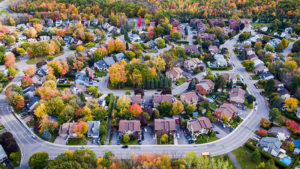Much like any type of organization, homeowners associations in North Carolina are bound by certain laws. As a member of your HOA board, it is imperative to familiarize yourself with these North Carolina HOA laws to better protect your community.
Understanding the Different North Carolina HOA Laws
An integral part of running a homeowners association is knowing the various laws that apply to your community. Making sure your association complies with these laws safeguards your HOA from potential liability. And while federal laws universally apply to all homeowners associations nationwide, some laws can vary depending on where your association is located.
Similar to many other states, North Carolina has its own set of laws that govern community associations. To better understand what these laws are, let’s break them down according to what type of association they relate to.
For Homeowners Associations
 The North Carolina Planned Community Act falls under the North Carolina General Statutes Chapter 47F. This Act governs homeowners associations in North Carolina, including how they must be created, managed, and operated. If your planned community was formed on or after January 1, 1999, it will follow this Act.
The North Carolina Planned Community Act falls under the North Carolina General Statutes Chapter 47F. This Act governs homeowners associations in North Carolina, including how they must be created, managed, and operated. If your planned community was formed on or after January 1, 1999, it will follow this Act.
There is an exception to this rule, though. Communities that consist of 20 or fewer lots operate outside of this Act. But, such communities can elect to fall under the sections of this Act by including it in their declaration. If an exempted association does not expressly opt-out of this statute, though, certain provisions can still apply to them. Examples of such are those concerning association powers, fines, and the display of flags and political signs.
The North Carolina Planned Community Act breaks down into three articles:
- Article 1 – General Provisions.
- Article 2 – Creation, Alteration, and Termination of Planned Communities.
- Article 3 – Management of Planned Community.
For Condominiums
On the subject of condominium associations, there are two Acts that can apply. The first is the North Carolina Condominium Act, which falls under the North Carolina General Statutes Chapter 47C. This Act governs the creation, management, and operation of condo associations created after October 1, 1986. Similar to the North Carolina Planned Community Act, certain provisions of this Act also apply to condo associations created prior to that date unless the association specifically opts out of it in their declaration.
There are four articles under the North Carolina Condominium Act:
- Article 1 – General Provisions.
- Article 2 – Creation, Alteration, and Termination of Condominiums.
- Article 3 – Management of the Condominium.
- Article 4 – Protection of Purchasers.
The second Act that applies to condo associations is the North Carolina Unit Ownership Act. This Act falls under the North Carolina General Statutes Chapter 47A. Compared to the previous Act, this one is much older and governs condo associations created prior to October 1, 1986. Unlike the Condominium Act, the Unit Ownership Act consists of more general provisions relating to condominium ownership.
There are only two articles under the North Carolina Ownership Act:
For Nonprofit Corporations
The North Carolina Nonprofit Corporation Act, found under the North Carolina General Statutes Chapter 55A, applies to nonprofit corporations in the state. The provisions of this Act relate more to the corporate structure and procedure of nonprofits. And, according to North Carolina HOA laws, homeowners associations created after January 1, 1999, that follow the Planned Community Act must incorporate as non-profit corporations.
The North Carolina Nonprofit Corporation Act consists of the following articles:
- Article 1 – General Provisions.
- Article 2 – Organization.
- Article 3 – Purposes and Powers.
- Article 4 – Names.
- Article 5 – Office and Agent.
- Article 6 – Members and Memberships.
- Article 7 – Members’ Meetings and Voting; Derivative Proceedings.
- Article 8 – Directors and Officers.
- Article 10 – Amendment of Articles of Incorporation and Bylaws.
- Article 11 – Merger.
- Article 11A – Conversions.
- Article 12 – Transfer of Assets.
- Article 13 – Distributions.
- Article 14 – Dissolution.
- Article 14A – Reorganization.
- Article 15 – Foreign Corporations.
- Article 16 – Records and Reports.
- Article 17 – Transition and Curative Provisions.
On the other hand, condo associations can be arranged as not-for-profit corporations or for-profit corporations. These associations also have the option to remain as unincorporated nonprofit associations. It is worth noting that for-profit corporations, including condo associations that incorporate as such, must follow the North Carolina Business Corporation Act.
Prohibited Acts by Debt Collectors
 The North Carolina Debt Collection Act (NCDCA) governs debt collection practices in the state. This Act protects consumers from unfair, deceptive, or abusive practices brought on by debt collectors. Under this Act, homeowners are considered consumers and HOA dues or fees as debts. It works similarly to the federal Fair Debt Collection Practices Act (FDCPA).
The North Carolina Debt Collection Act (NCDCA) governs debt collection practices in the state. This Act protects consumers from unfair, deceptive, or abusive practices brought on by debt collectors. Under this Act, homeowners are considered consumers and HOA dues or fees as debts. It works similarly to the federal Fair Debt Collection Practices Act (FDCPA).
There is one key difference, though, between the FDCPA and North Carolina’s debt collection laws. The FDCPA defines debt collectors as third parties that collect debt on behalf of others, whereas the NCDCA considers creditors as debt collectors, too. That means state-level debt collection laws also apply to creditors trying to collect their own debts, possibly including homeowners and condo associations as well.
Fair Housing Laws
The North Carolina State Fair Housing Act protects certain classes of people from housing discrimination. According to this Act, housing providers, including community associations, cannot discriminate against people based on their race, color, national origin, sex, religion, familial status, or handicapping condition. In many ways, this Act functions similarly to the federal Fair Housing Act.
Housing discrimination victims can submit a complaint to the U.S. Department of Housing and Urban Development or the North Carolina Civil Rights Division. Complaints must be filed within a year from the date of the act of housing discrimination. Alternatively, victims can also choose to file a private lawsuit within two years of the act in the federal district court.
Disabilities Act
North Carolina’s Persons With Disabilities Protection Act offers protection to persons with physical or mental impairments from discrimination in places of public accommodations. Within the context of community associations, this applies to any common areas or spaces open to the general public. Associations must reasonably accommodate persons with disabilities and make these public areas accessible to them. It is similar to the federal Americans With Disabilities Act.
Diving Into Specific HOA Laws in North Carolina
While the North Carolina Planned Community Act covers an extensive range of subjects, there are a few that come up more often. Here are the provisions to some of the most common HOA topics:
Inspection of Association Records
According to Section 47F-3-118 of the Planned Community Act, associations must keep detailed financial records and make them reasonably available to their members (or their authorized agents) for inspection. At a minimum, HOAs must keep accurate records of the association’s assets, liabilities, expenditures, and cash receipts. Additionally, associations must present all lot owners with the HOA’s annual balance sheet and income statement within 75 days following the end of the fiscal year.
Mediation Prior to Litigation
According to North Carolina HOA laws, associations must inform members of their right to a mediation process when disputes arise. Associations must do this at least on a yearly basis. Additionally, Section 7A-38.3F encourages parties of a dispute to first go through mediation before turning to litigation. This, of course, does not apply to disputes concerning delinquencies.
Surplus Funds
On occasion, homeowners associations will find themselves with surplus funds. When this happens, you must turn to your declaration for guidance. If your declaration remains mum on the issue, Section 47F-3-114 dictates that any surplus funds should be returned to the membership or deducted from future dues and assessments.
Flags and Political Signs
According to Section 47F-3-121 of the Planned Community Act, associations may not restrict owners from displaying the United States flag or the flag of North Carolina that measures no more than 4 x 6 ft. Of course, this is provided the owner displays the flag in compliance with Title 4 of the U.S. Code. The exception to this rule, though, is when an association uses appropriate language regulating or prohibiting flag displays within its declaration. Similar provisions exist when it comes to the display of political signs.
All Associations Need Help
 Understanding the different federal and North Carolina HOA laws that apply to your association can come as a challenge. Considering the importance of abiding by these laws, though, all associations must make an effort to remain informed. If your HOA board finds it difficult, perhaps it is time to outsource the job to a trusted HOA management company.
Understanding the different federal and North Carolina HOA laws that apply to your association can come as a challenge. Considering the importance of abiding by these laws, though, all associations must make an effort to remain informed. If your HOA board finds it difficult, perhaps it is time to outsource the job to a trusted HOA management company.
In addition to a wealth of other services, Cedar Management Group provides legal assistance to community associations in North Carolina. Call us today at (877) 252-3327 or contact us online to request a proposal.
RELATED ARTICLES:
- Homeowners Rights Against HOA: Avoiding Conflict In The Community
- What Every Board Member Should Know About HOA Collections
- HOA Collections And The Fair Debt Collection Practices Act






